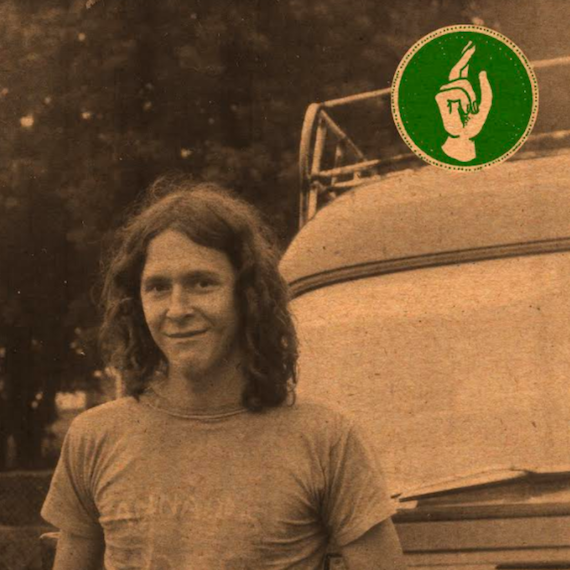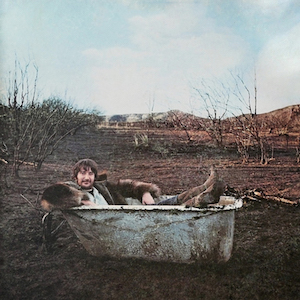
Despite a notoriously terrible memory, I’m really good at remembering hearing things for the first time, and I have always been able to associate my initial encounters with certain records with times, places, and people.
When I go on tour with other musicians, I rarely bring music from my own collection, preferring instead to expose myself to the various CDs and playlists of my traveling companions. Over the years, I’ve discovered a lot of music this way, and I often return home from such trips with notebook pages full of new records to seek out. Sometimes if I hear something in the van I really like, I’ll ask about it, but more often I prefer to play it cool. To be overly inquisitive in such situations can be a buzzkill, like commenting on how and why a just-told joke was funny instead of just laughing.
Because I am sensitive to this fragile dynamic of the shared band-space, I’ll often use discretion, making a little note of a song lyric that stands out, with plans to identify the song later via Google. (I’m not a smartphone guy, so Shazam is not an option).
The first time I heard Pat Ament was during a tour with Simon Joyner and his band. I was sitting in the back seat of the van with Kevin and Megan, with Simon at the wheel and David Nance riding shotgun. Someone selected from their iPod an album I’d never heard before, and I liked it immediately. It reminded me, in mood, of certain private press Doors worshipers like Gyp Fox and Faction, but with a much stronger emphasis on songwriting. The songs were great.
“What is this?” I finally asked. “Paddamin,” answered David. Hmm. Into the notebook. P-A-D-D-A-M-I-N.
A few songs later, I had to know more. “Has this been reissued anywhere?” I was told it hadn’t been, with Simon adding, mysteriously: “This is kind of an Omaha secret.” Omaha, I remember thinking. Paddamin from Omaha. Probably early 70s, from the sound of it. This shouldn’t be too hard to find. I didn’t think about it again until I was home a few weeks later.
It took a while to discover that “Paddamin” was actually “Pat Ament,” and he hailed not from Omaha but from Colorado. The album had only been sold on Discogs once—for the princely sum of $150.00. I checked my other usual online sources to try to locate the record, and turned up nothing. This rarely happens; there’s always at least the opportunity to buy a desired record, even if that record is out of my price range. But this Pat Ament album didn’t seem to exist outside of our tour van and a lone Discogs entry that didn’t even include a photo of the album sleeve. My most creative Googling only provided info on some rock climbing dude (see interview below), with no results for ‘“Pat Ament” and “private press” and “music” and “LP,”’ or any variation thereof.

February 21st, 2018 | Pat Ament • 1 Comment







 Watcha gonna do? – often heard when people appear to be shit out of luck or otherwise down and out. But this time it was the title of Denny Doherty’s first solo album after The Mamas and the Papas quietly disbanded in 1968 following the release of The Papas & The Mamas. Mama Cass had found solo success with “Dream a Little Dream of Me” while Papa John released his own country rock opus John, The Wolfking of L.A. and his ex-wife (the band’s other Mama) Michelle began a successful acting career. As for Denny, he said to Rolling Stone’s Ben Fong-Torres in 1971, “I just sat around, and in the interim I got a thing from ABC/Dunhill President Jay Lasker saying I owed this amount of money for no project. So I said ‘Whatever’s right,’ and did an album.” As is the case with most cult albums, Watcha Gonna Do was recorded so the man could get his money.
Watcha gonna do? – often heard when people appear to be shit out of luck or otherwise down and out. But this time it was the title of Denny Doherty’s first solo album after The Mamas and the Papas quietly disbanded in 1968 following the release of The Papas & The Mamas. Mama Cass had found solo success with “Dream a Little Dream of Me” while Papa John released his own country rock opus John, The Wolfking of L.A. and his ex-wife (the band’s other Mama) Michelle began a successful acting career. As for Denny, he said to Rolling Stone’s Ben Fong-Torres in 1971, “I just sat around, and in the interim I got a thing from ABC/Dunhill President Jay Lasker saying I owed this amount of money for no project. So I said ‘Whatever’s right,’ and did an album.” As is the case with most cult albums, Watcha Gonna Do was recorded so the man could get his money.

















